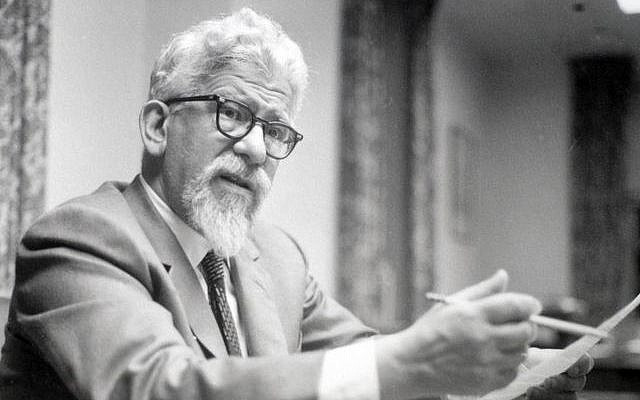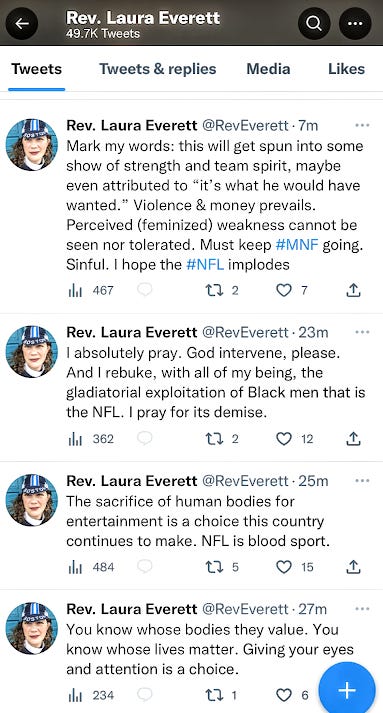|
Author of "Embracing Auschwitz" and "Mensch•Marks: Life Lessons of a Human Rabbi - Wisdom for Untethered Times." Winner of the Rockower Award, the highest honor in Jewish journalism and 2019 Religion News Association Award for Excellence in Commentary. Musings of a rabbi, journalist, father, husband, poodle-owner, Red Sox fan and self-proclaimed mensch, taken from essays, columns, sermons and thin air. Writes regularly in the New York Jewish Week and Times of Israel.
Thursday, January 12, 2023
In This Moment: ADL Antisemitism Survey, Friday the 13th, Israel's Judicial Break-Glass Moment
Monday, January 9, 2023
Heschel’s audacity and Hamlin’s injury (Times of Israel)
FEATURED POST
Heschel’s audacity and Hamlin’s injury
A half-century ago, American Jewry lost arguably its leading spiritual light. There are others who deserve a spot on that Mount Sinai/Rushmore of moral beacons, but it’s hard to deny Abraham Joshua Heschel’s place in the pantheon. His influence approaches that of his friend, Martin Luther King, Jr., whom he outlived by four years, passing away in the winter of 1972. Heschel’s 50th yahrzeit (the anniversary of the death, according to the Jewish calendar) falls this Wednesday.
Here is the text (bold is mine):
I look forward to privilege of being present at meeting tomorrow. Likelihood exists that Negro problem will be like the weather. Everybody talks about it but nobody does anything about it. Please demand of religious leaders personal involvement not just solemn declaration. We forfeit the right to worship God as long as we continue to humiliate Negroes. Church synagogue have failed. They must repent. Ask of religious leaders to call for national repentance and personal sacrifice. Let religious leaders donate one month’s salary toward fund for Negro housing and education. I propose that you Mr. President declare state of moral emergency. A Marshall plan for aid to Negroes is becoming a necessity. The hour calls for moral grandeur and spiritual audacity.
Israel’s Judiciary: Reform or Ruin? Keep Watching
I could not help but think of Heschel’s telegram as I read through this tweet-thread by an outspoken pastor in Massachusetts, who took on a Heschelian posture following the shocking injury to Buffalo Bills’ safety Damar Hamlin last Monday night. Thankfully, Hamlin’s condition has improved dramatically since then, but when she wrote this, millions of Americans were still watching the horror unfold before their eyes (24 million were watching the actual broadcast, the largest number ever for Monday Night Football on ESPN).
I admit to being a more-than-casual fan who would have trouble giving up football. But Everett’s comments, which I read as I watched the player continue to lie prone on the field, gave me pause. It should be noted that the game was not resumed, as Everett (and I) believed would happen at that time. The NFL thankfully did not go that macho route, which would have been foolhardy. Grown men were allowed to cry and the world did not come to an end.
But routinely, NFL games continue even as players are being carted off with life-altering (and sometimes life-threatening) injuries. For we fans, those moments are usually a good opportunity for a quick bathroom break, or a chance to zap some nachos. Catastrophic injury has been woven into the banal routine of sports viewing.
No one grabbed for the nachos last Monday. And those who did out of Pavlovian habit, had to wonder, at least for a millisecond, What am I doing??
As the games now go on this weekend, it will be hard for the narrative not to switch back to a cliched, football-centric “Win one for Damar!” as Rev Everett predicted it would in her tweets. Team spirit is all well and good, but the seriousness of what millions saw unfold before their eyes should not be allowed to be reduced to a motivational morality play. “Win one for the Gipper” has seen its day and that day is not now.
I also hope that God won’t be thrust to center stage here. I know that has already happened. But we need to bring religion into this with the same degree of care that the paramedics used in strapping Hamlin onto the stretcher last week, and with a modicum of humility. While I have no idea whether the prayers of millions helped save this one life (as opposed to the heroic work of a few emergency medical staffers), I would not want this incident to be wrapped around the flag of football’s righteous brotherhood or Buffalo’s postseason aspirations. God does not want to reward the Bills for their suffering – otherwise Scott Norwood’s kick never would have gone wide right in the Super Bowl. God had nothing to do with that – and this, at least as far as I know.
But what haunts me most right now – now that the most dangerous time seems to have passed for Hamlin – is Everett’s comment about the NFL being “blood sport” and Heschel’s blunt assertions on the failure of political and religious institutions to honestly address racism in America. Numerous questions spring to mind:
- What role, exactly, does football play in our society? Does it enable us to address systemic racism in new and creative ways, or does it impede progress? By being dishonest in assessing the dangers to life and limb, are we perpetuating those very inequities that have existed in America for so long? Is there a racial element to this at all? Do certain lives not matter as much? Do we rush for the nachos and head for the bathroom when a quarterback or wide receiver lies on the field or just for the linemen?
- Racist or not, why are we so inclined to pile human beings into that meat grinder? Are we no better than bloodthirsty Romans? Are we seeking pleasure through the physical punishment of fellow human beings? Is this some innate need that we have?
- Was Heschel right in suggesting, in a different context, that by knowingly subjecting innocent people to danger – even with their full (and supposedly informed) consent – we religious leaders have ceded our moral authority? Churches and synagogues have failed, Heschel said bluntly, because they have subjected people to danger and therefore to humiliation. Our hypocrisy knows no bounds as we kneel at midfield and pray for good sportsmanship while failing to call out the NFL’s massive concussion cover up. Should religious leaders be speaking out more?
Hamlin’s injury can be tossed off as much more freakish than the more common football injuries that are now on the upswing, involving the brain, spine, hamstring and just about every body part. But that brings little comfort, as the memory loss seem contagious, numbing the spectator’s recollection of these episodes, nearly as much as the “dinged” participant’s. We quickly move on to the next rushed commercial as yet another player is carted off to the “blue tent,” a purgatory-like place where he can be out of sight and out of mind. We’ll get an update from a sideline reporter, which will help us to adjust our betting prospects and fantasy schemes, when instead, each late hit should slap our souls, and not only when the victim is on our team. Is our willingness to look the other way increasing as intensively as the severity of those injuries we choose to ignore?
Ultimately, all the questions boil down to this:
Are we placing people in grave danger – much graver than we realized – just so we can enjoy some popcorn, while away a weekend afternoon and perhaps make a few bucks? Is the primary problem racism, boredom or greed?
Last Monday night, America could no longer look the other way. Rabbi Heschel reminds us what’s at stake. This hour calls for moral grandeur and spiritual audacity, and we must ask the same question that Heschel had the chutzpah to ask the President of the United States, a president who desperately wanted to keep King from marching on Washington, who wanted the problem to go away. JFK never placed racism at the top of his agenda, until King’s moral message got through, with the help of Heschel’s telegram and a landmark speech that Heschel gave at the prior conference.
And so I ask, as Rabbi Heschel asked, have we religious leaders forfeited the right to worship God because we’ve knowingly, and with intent, brought pain and humiliation to fellow human beings?
I don’t know the answer to any of these questions, but I feel compelled to pose them because I’m shaken. I’m actually inclined to believe that at its root, the problem is not racism at all, because for most of us, the players aren’t even people. They are objects. This past week may have begun to change all that. I pray that it has.
I’ll still root for the Patriots on Sunday. How could I not? They’re my team. But I’m no longer sure what that means.



















